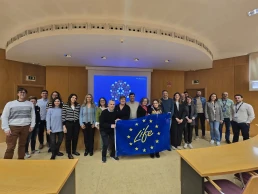The End-of-Waste Criteria Under Review at ITC
Castellón, 13 March 2025
The Institute of Ceramic Technology (ITC) hosted an Info Day within the framework of the LIFE REPLAY project to analyse the end-of-waste criteria, a legal concept defining when waste ceases to be considered as such.
The event was opened by the Regional Director for Environment and Territory of the GVA, alongside Irina Celades, Secretary of the Governing Board and Technical Director of ITC, who for many years was also head of the Sustainability Area at the Castellón-based technology centre.
At 10:00 a.m., the Info Day began under the title: “End-of-Waste Condition: Practical Aspects and Legal Implications”. Speakers from public administrations included Elisa Cacharro Caminero, Program Director at the General Subdirectorate for Waste of the Ministry for Ecological Transition and the Demographic Challenge, who discussed waste legislation, the concept of end-of-waste, and the current situation in Spain. Enrique López Balaguer, Head of the Waste Prevention and Reuse Service at the General Directorate for Environmental Quality and Education of the GVA, presented the specific context in the Valencian Community.
A round table followed under the title “Solutions and Strategies to Meet the End-of-Waste Criteria: The LIFE REPLAY Case and the Ceramic Sector,” with contributions from waste managers, inks producers, and ceramic manufacturers.
After the introductory presentation by the moderator (Dr. Francisca Quereda, Head of the Materials and Ceramic Technologies Area at ITC), the round table brought together several perspectives: Teresa Izquierdo from CTR Mediterráneo, representing waste management side; Alejandro Grijalbo from AKCOAT, speaking as a pigment and ink manufacturer; and Gloria Costas from TECHLAM, offering the view of a ceramic tile manufacturer.
The day continued with networking among nine EU-funded LIFE projects, including:
LIFE-ZEROLANDFILLING: Recovering landfill waste through an innovative, integrated process committed to the circular economy – presented by Teresa Simorte Gancedo (FCC Medioambiente).
LIFE-WEEELOOP: Expansion of the WEEELOOP model for a circular hob industry – presented by Mikel Telleria (COPRECI, S. Coop.).
LIFE-POLITEX: Fibre-to-fibre full circularity in the textile sector through novel polyester recycling technologies – presented by Javier García Córdoba (AITEX).
Z-ONA4LIFE: Aluminium foundries circularity via holistic zeolite production for effluents depuration – presented by Aurora López Delgado (Eduardo Torroja Institute for Construction Science, CSIC).
LIFE Waste2Coag: Brine and metal waste recovery to produce coagulants for wastewater treatment – presented by Feliu Sempere Nàcher (Global Omnium).
LIFE REWAINCER: A new model for reclaimed water use in industrial environments in the ceramic sector – presented by Gracia María Silvestre Tormo (FACSA), with ITC participation.
LIFE CYCLOPS: upCYCLling pOlyPhenols from waSte – presented by Rubén Titos Guillén (Cetaqua).
LIFE SuperBiodiesel: Advanced biodiesel production from animal waste using supercritical technologies – presented by Juan Antonio Micó (AIJU).
LIFE ZEBRA: Zero Emission Biochemical and Renewable Additives – presented by Emma Pipó Ollé (Inveniam Group).
Each project presented its approach to waste valorisation and circular economy.
An open-discussion emphasized collaboration, sharing of lessons learned, and policy recommendations to accelerate recognition of end-of-waste status.

Coordinated by ITC, LIFE REPLAY (LIFE20/ENV/ES/000115) is funded by the EU LIFE Programme and aims to transform waste into resources—specifically, by giving a second life to digital inkjet decoration inks.


